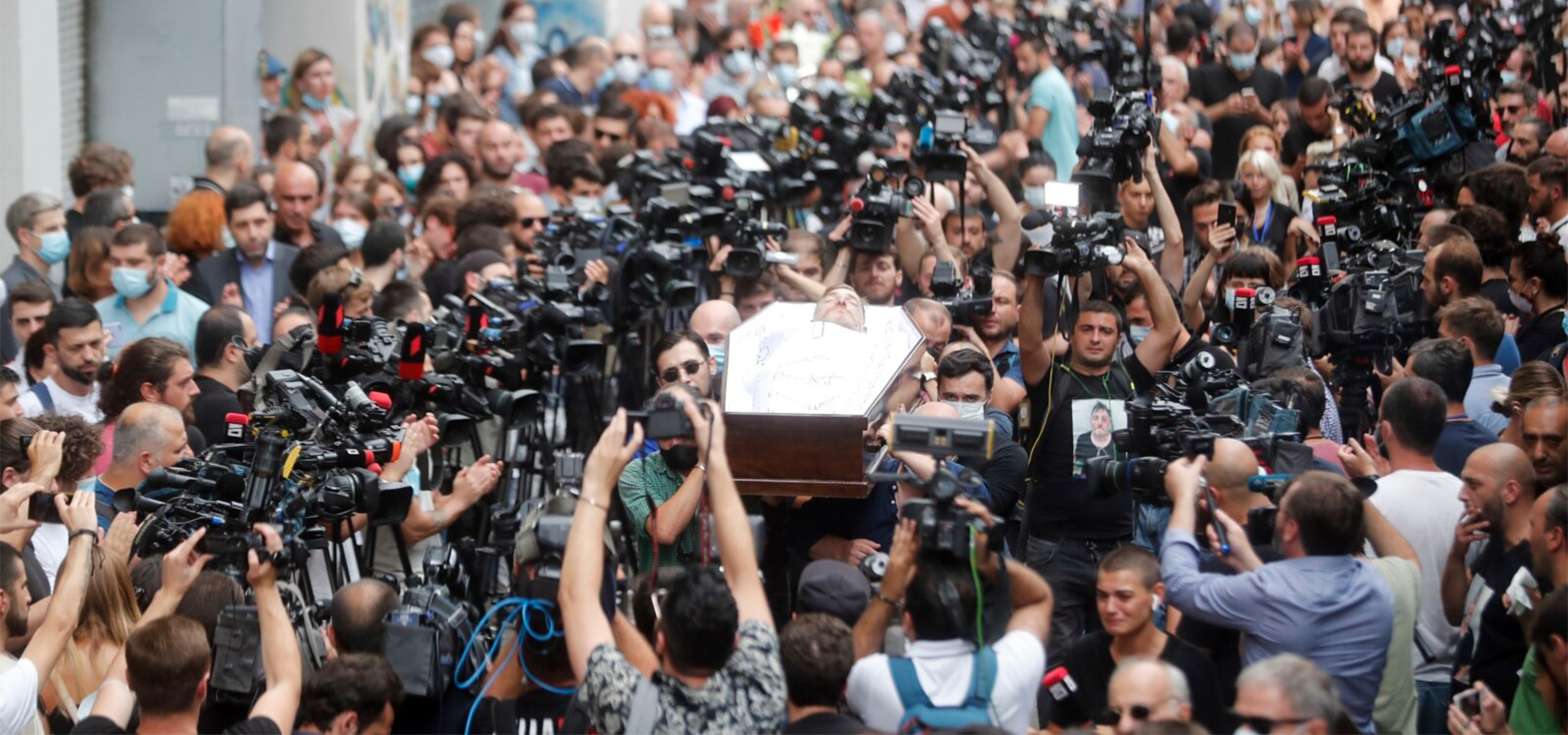Anxiety, fear, hunger, sleeping on the street… I went through horror, says Guga Dvalishvili. He believed he could make it to America through Columbia. In wait for his coyote (human smuggler), he spent days in the hotel and would hardly dare to leave. He had to stay in the neighborhood of drug cartels. He was warned that the traffickers might kidnap and sell him. Guga is a journalist, who, like many of his fellow peers, was forced by circumstances to flee to exile.
‘’I went through 12 countries to get here’’
For years, Levan Kalandia worked as a cameraman for Rustavi 2 station and then for Mtavari Arkhi. He worked in the hottest spots – conflicts, wars, raids. He is currently also in exile, working on a press machine in an automobile parts factory in the Irish city of Letterkenny.
‘’At first, I wanted to go to Canada. I approached one lady through connections. She promised she would help me with the visa. First, I went to Poland, then Germany. I traveled to 12 countries while waiting to get a Canadian visa. Nothing came of it. I lost a lot of money and ended up in Ireland.’’
In the last 5 years, about 60 media representatives left the country. The list is incomplete and growing. Most turned themselves in as refugees or political exiles. More than a few had to break the law to achieve this goal.
Georgian News contacted most of the emigrated journalists and inquired as to what made them give up their profession, what they are doing now, the path they went through to start a new life in a foreign country, and in which case they would consider repatriating.
Guga Dvalishvili worked as a journalist at TV Formula. In order to get to the US, he tried to enter Mexico through the Colombian border. But things didn’t go to plan. Now he is working in a restaurant in Madrid and learning Spanish.
According to the data of the National Statistics Office, 100,802 Georgian citizens emigrated last year alone. This number has increased by 20% compared to 2021 - (80,351). Journalists emigrated before, but after the July 5 raid in 2021, the number of media workers leaving the country surged. ‘’I grew disheartened when I first put on a white uniform and went to the restaurant for work. I missed my microphone. But then I collected myself, came back to reality, and realized I was starting from a clean slate.
I work in different places. Sometimes as a waiter or a bartender, also in the food delivery service. I am a resident and I obtained a work permit. The first day, starting everything from scratch, was the hardest. You start by buying a cup, a plate... things like that.
One of the through-provoking experiences that made me decide to come here was the events of July 5, when journalists were savagely assaulted, among them, they beat my cameraman, Lekso Lashkarava to death’’, - Aleksi Megrelishvili, a former journalist of TV Priveli.
He loved his profession, and he enjoyed what he did, but says that he could no longer cope with the pressure on independent media from the government, and fled to the United States, New York.
‘’I was no longer happy doing this work in Georgia. I realized that years went by, I kept working and the situation was only getting more unbearable by the day. I went out to shoot a piece and didn’t know what awaited me, whether I would come back in one piece or not. I also became fed up with the perpetually ugly political situation in the country, with no sign of light at the end of the tunnel. For all this, my finances were just enough for me to get by month to month. I was approaching 30 and finally decided I had to change something.
Lekso [Lashkarava] used to tell me that he wanted to go to America. He said he couldn’t achieve anything here, he was not appreciated, but the only thing was he couldn’t abandon his mother, he was her only child. Lekso was killed. He also told me I should go there myself and make films. I recently released the trailer for my documentary and in a way, fulfilled my promise to him.’’
The feeling of insecurity and finances - are the two main problems shared by all emigrant journalists.
‘’I always had a feeling of insecurity in Georgia, because I never held back from criticizing anyone, regardless of who was in power. The duty of the journalist is to remind the government of its function in an attempt to keep them in line. Aggression was always felt during shooting.
As we walked down the street holding a microphone, we would hear swear words in our direction from certain groups. Unfortunately, a general sentiment got established [in Georgia] that journalism is a bad profession. The responsibility for this lies with the government.
This is effectively an attempt to annihilate free media,’’ says Natia Kopaliani, who has worked in almost all broadcasting platforms over the last 15 years and finally ended up in Florence. She left the country nine months ago and now lives in Italy. ‘’I work in a restaurant as a waitress’’ tells us Natia, ‘’It is very difficult to be separated from my child. Being an emigrant is tough. There is human tragedy involved apart from just emigration statistics’’
In 2022, Georgia's ranking in the Press Freedom Index significantly worsened. Reporters Without Borders is an authoritative international organization defending media freedom. In their ranking, Georgia moved from 60th to 89th place among 180 countries.
‘’I have been living in New York for the past one year. I am relaxed, not afraid that someone will attack me from behind or throw stones at me. I sometimes work as a bartender, sometimes as a waiter", - Makho Mikeladze left journalism on June 13, 2022 and moved to the US. The reasons are similar.
‘’The radicals were given a green light against us. The police did anything. Life in Georgia is becoming dangerous for a person working in critical media. It is a syndrome of impunity. Violence against journalists has become routine; everyone is doing it.
Another person who abandoned both his country and profession is David Jalaghonia. He used to work in BMG. He doubled as a presenter and a web editor. Now he works in bars. He has a 10-year experience of working in media under his belt. ‘’I left the country in 2020 and moved to New York. The first attempt at a green card was successful.
The decision to leave was influenced by my and my family's limited financial resources. I had a relatively decent salary, but not enough to improve my living conditions. It is hard to work as a journalist and ensure financial security for the future.
The primary reason journalists are leaving Georgia is the hatred and aggression routinely directed against them. We have witnessed beaten and crippled journalists on the streets of Tbilisi over the past few years. Then there’s the problem of salary. Everyone has responsibilities to their family, some have kids, and others are paying for bank loans. But regardless, trust me, leaving the profession and the country behind is the most difficult step to take for a journalist. Many ask me about the green card, and I give them guidance, but most do not win.’’
According to the 2022 data of the European Union Agency for Asylum, last year, 28,787 citizens of Georgia applied for asylum in the EU countries, and 23% of the entire population of the country emigrated.
‘’I started my journalistic career in 2000, at Radio Atinati in Zugdidi. In 2011, I moved to the online publication LivePress. I believed I had a very interesting profession. Every day was different. In recent years, I faced such financial problems that I could not solve in Georgia, and that’s why I left for the United States. I don’t know when I will come back. It’s hard to leave a place where you spent years earning trust and respect, and where you put so much work into your favorite craft,’’ Nana Khubutia, like many of her peers, currently resides in the United States and works as a babysitter.
The social and political environment made tens of journalists give up their profession. Increased violence forced many of them to start a new life in exile. They struggle morally, psychologically, and financially, but they prefer to start everything from scratch rather than stay in this toxic environment.

On July 5-6, 2021, extremist groups attacked 53 journalists in Tbilisi streets
This year alone, we have counted up to 50 cases of illegal obstruction of journalistic activities – officials and activists of Georgian Dream are already blatantly attacking representatives of critical media in front of cameras. The Chairman of the ruling party Georgian Dream, Irakli Kobakhidze, cynically calls this civil activism and further stimulates the violence that already runs rampant and enjoys impunity. The Special Investigative Service, which is tasked with working crimes against media, has most of these cases shelved. Of the 50 crimes reported this year, only four have been investigated.
The facts of illegal tapping and surveillance of journalists are still uninvestigated. 48 journalists are known victims in the so-called ‘’case of leaked filed from SSSG’’ (State Security Service).
Emigrated journalists are looking forward to the 2024 elections as their last hope for change and a chance to return home and continue their work. But for now, the list of journalists leaving their profession, family, and country, is still growing.






